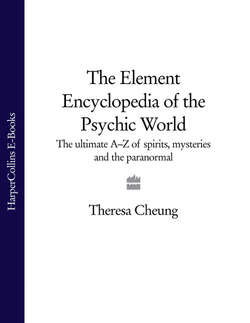Читать книгу The Element Encyclopedia of the Psychic World: The Ultimate A–Z of Spirits, Mysteries and the Paranormal - Theresa Cheung, Theresa Cheung - Страница 33
ALCHEMY
ОглавлениеThe term alchemy, commonly believed to refer to attempts to change base metals into gold, covers a wide range of topics -from the discovery of a single cure for all diseases to the quest for immortality, from the creation of artificial life to straightforward descriptions of scientific techniques. Broadly, one could describe alchemy as the art of converting that which is base, both in the material and spiritual world, into something more perfect. Symbolically, alchemy is the mystical art for human spiritual transformation into a higher form of being.
The spiritual teachings of alchemy were based on the idea that humans have a spirit or soul as well as a physical body, and it was thought that if the spirit could be compressed or concentrated, the secret of changing one aspect of nature into another could be discovered. The elusive catalyst that allowed this change to take place is known as the philosopher’s stone, which is not a stone but a powder or liquid that turned base metal into gold and, when swallowed, gave everlasting life.
Alchemists are often pictured as stirring a bubbling concoction of base metal on a fire, hoping it will turn to gold. However, not all alchemists were like this, and some of the best minds of the last twenty or so centuries have studied alchemy as a way to unlock the secrets of nature.
Alchemy probably first emerged in ancient Egypt and China. In China it was purported to transmute base metals into gold, and the gold so produced was thought to have the ability to cure disease and prolong life. In Egypt the methods of transmutation were kept secret by temple priests. Western alchemy has its basis in the skills of those Egyptian priests, Eastern mysticism and the Aristotelian theory of the composition of matter. Aristotle, following the theory of Empedocles, taught that all matter was composed of four elements: water, fire, earth and air. Different materials found in nature contained different ratios of these four elements, and so by proper treatment a base metal could be turned to gold.
In the eighth and ninth centuries, Chinese, Greek, and Alexandrian alchemical lore entered the Arab world. Arabian alchemists postulated that all metals were composed not of four elements but of two: sulphur and mercury. They also adopted the Chinese alchemists’ concept of a philosopher’s stone - a medicine that could turn a sick (base) metal into gold and act as the El or elixir of life - and so begun a never-ending quest for this elusive catalyst.
Arab alchemical treatises were popular in the Middle Ages. Indirectly, through Arabic, Greek manuscripts were translated into Latin, and alchemical explanations of the nature of matter can be found in the treatises of such scholars as Albertus Magnus (c.1200-1280) and Roger Bacon (c.1214-1292).
Before the scientific revolution, alchemists were respected figures on the European scene, and kings and nobles often supported them in the hope of increasing their revenue. But among the sincere were charlatans and swindlers, and their fraudulent activities led to alchemy getting a bad name. Even as late as 1783 a chemist called John Price claimed he had turned mercury into gold. When he was asked by the Royal Society to perform the experiment in public, he reluctantly agreed. On the appointed day, however, he drank some poison and died in front of the invited audience.
In the sixteenth and seventeenth centuries, many practical alchemists, like Paracelsus, the first in Europe to mention zinc and use the word ‘alcohol’, turned from trying to make gold towards preparing medicine. The story is told of a seventeenth-century chemist who claimed he had found the elixir of life in the waters of a mineral spring. This substance has since been identified as the laxative sodium sulphate.
After the scientific revolution in the seventeenth century, alchemy became marginalized, and interest in transmutation became limited to astrologers and numerologists. Nevertheless, the scientific facts that had been accumulated by alchemists in their search for gold became the basis for modern chemistry. In the West, interest in the spiritual dimension of alchemy was rekindled in the mid-twentieth century through the work of psychiatrist Carl Jung on alchemical spirituality.
Today there are few practising alchemists. The fact is, scientists have discovered how to change base metals into gold, but the process is uneconomical and so alchemy today is a spiritual rather than a practical quest. Sincere seekers are people of great wisdom and morality. For them the search for spiritual perfection takes precedence over the quest for easy riches. Genuine alchemists see the universe as a unity and believe that by exploring the infinite workings of its parts they can better understand the whole. The symbolism of turning base metal into gold represents exactly what they are trying to do within themselves - refine themselves spiritually - and it could be said that alchemists are simply taking a more scientific approach to the age-old quest to ‘know thyself.
